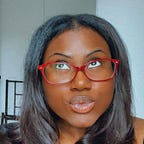Brands are Embracing Black Women, But We’re Not Done Yet
--
As we approach 2020, it is both equally refreshing and irksome that companies are finally starting to realize the importance of black women in the representation of their marketing efforts.
It is no secret that black women are the creators of culture — the mecca of all trends, and the center of innovation, novelty, and ubiquity. Essentially, we make shit cool. However, this isn’t the only reason why big brands should put black women at the forefront of their campaigns. By 2021, the consumer preferences and brand loyalty amongst black women is expected to drive black spending to $1.5 trillion (Nielson 2017). Yes, you read that right, trillion.
It seems as though this reason alone would prompt brands to put black women at the forefront of every campaign (money talks, right?) — but this isn’t the case. I can count on one hand the number of ad campaigns and brand partnerships that feature black women at the forefront, and I’m sure you can too. However, I didn’t write this article to complain. There is progress being made and there is something to be said about brands who are authentically moving towards diversity, equality, and inclusion.
Here are some of the most noteworthy, purposeful, and #blackgirlmagic-esc ad campaigns of the year.
Absolut ft. Lizzo #GetJuicy
Lizzo is arguably the breakout act of the year, most recently solidifying her spot in the industry with a 7-week reign at #1 on the Billboard Hot 100. The Truth Hurts songstress is not only a chart-topper, but a champion for self-love, body acceptance, and living in color. The boldness of her artistry seamlessly aligned with the core of the Absolut brand, creating a perfect synergy for the launch of the company’s refreshed product line.
The #GetJuicy campaign paired a lighthearted message with an omnipresent media strategy, via print, social, television, and OOH placements, producing one of the memorable spots of the summer. This neo-classic approach created a +2.5% Q3 increase for Pernod Richard, Absolut’s parent company (Pernod Richard). The fact of the matter is, black women garner results, and Lizzo does a great job of proving it.
Fendi ft. Nicki Minaj — Fendi Prints On
In 2018, the “Chun-Li” rapper used her lyrical dexterity to plug the Italian luxury fashion house — Fendi. The platinum record not only set the rap icon up for a successful release of her 4th studio album, but it put Fendi back into the consideration set of luxury fashion consumers. According to Statista, Fendi’s brand value increased from 2.1B euros in Q2 of 2018 to 2.5B euros in Q3 of 2018 — the same time Minaj released “Chun Li”.
Fendi clearly recognized the impact of the rap single, launching a Spring 2020 capsule collection with Minaj, titled #FendiPrintsOn, this October. The collection comes in classic Minaj style, featuring a variety of pink and metallic pieces, ranging in style and size. Aside from this collaboration being a win for the representation of black women in high fashion, the #FendiPrintsOn collection certifies hip-hop’s impact in the global landscape, transcending far beyond the bounds of urban and street culture.
L’Oréal Paris partnership with Viola Davis
L’Oréal Paris has a proven track record of championing diversity in the beauty industry. While the brand has executed an array of inclusive campaigns from “True Match” to “This Is An Ad for Men”, the decision to have Viola Davis as the new face of the brand, signifies a much needed change in how consumers perceive beauty and age.
The award-winning actress will be featured in the “Age Perfect” campaign to promote the brand’s new mature skincare line. The core messaging and tagline of the campaign will be “Because I’m Worth It”, shining a light on the actresses’ persistence in her journey towards success. While it’s too early to evaluate the metrics of the partnership, the beauty industry can be assured that Davis will make a timeless mark.
Issa Rae becomes the voice of Google Assistant
Issa Rae, actress, producer, writer, and creator of the award-winning HBO series, Insecure, is the true embodiment of a modern-day renaissance woman. Nevertheless, it’s no surprise that she partnered with Google Assistant to venture into voice technology. Starting last month, Rae’s voice is now available for a limited time in the U.S.
While the pairing signifies a positive shift towards inclusion in voice assistant technology (an industry built upon fundamental gender and racial biases), it more importantly shows that black women aren't just fitting for beauty and fashion campaigns, but can flawlessly occupy all spaces. Big tech, take note.
If you take anything anyway from this analysis, it’s that there is work to be done, despite the recent and historic strides. Let’s hope the representation of black women in communication efforts, campaigns and sponsorships isn’t just a trend, but here to stay.
